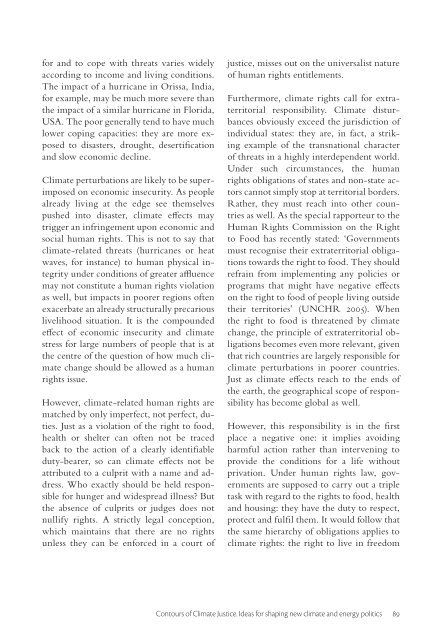Contours of Climate Justice - Dag Hammarskjöld Foundation
Contours of Climate Justice - Dag Hammarskjöld Foundation
Contours of Climate Justice - Dag Hammarskjöld Foundation
You also want an ePaper? Increase the reach of your titles
YUMPU automatically turns print PDFs into web optimized ePapers that Google loves.
for and to cope with threats varies widely<br />
according to income and living conditions.<br />
The impact <strong>of</strong> a hurricane in Orissa, India,<br />
for example, may be much more severe than<br />
the impact <strong>of</strong> a similar hurricane in Florida,<br />
USA. The poor generally tend to have much<br />
lower coping capacities: they are more exposed<br />
to disasters, drought, desertifi cation<br />
and slow economic decline.<br />
<strong>Climate</strong> perturbations are likely to be superimposed<br />
on economic insecurity. As people<br />
already living at the edge see themselves<br />
pushed into disaster, climate eff ects may<br />
trigger an infringement upon economic and<br />
social human rights. This is not to say that<br />
climate-related threats (hurricanes or heat<br />
waves, for instance) to human physical integrity<br />
under conditions <strong>of</strong> greater affl uence<br />
may not constitute a human rights violation<br />
as well, but impacts in poorer regions <strong>of</strong>ten<br />
exacerbate an already structurally precarious<br />
livelihood situation. It is the compounded<br />
eff ect <strong>of</strong> economic insecurity and climate<br />
stress for large numbers <strong>of</strong> people that is at<br />
the centre <strong>of</strong> the question <strong>of</strong> how much climate<br />
change should be allowed as a human<br />
rights issue.<br />
However, climate-related human rights are<br />
matched by only imperfect, not perfect, duties.<br />
Just as a violation <strong>of</strong> the right to food,<br />
health or shelter can <strong>of</strong>ten not be traced<br />
back to the action <strong>of</strong> a clearly identifi able<br />
duty-bearer, so can climate eff ects not be<br />
attributed to a culprit with a name and address.<br />
Who exactly should be held responsible<br />
for hunger and widespread illness? But<br />
the absence <strong>of</strong> culprits or judges does not<br />
nullify rights. A strictly legal conception,<br />
which maintains that there are no rights<br />
unless they can be enforced in a court <strong>of</strong><br />
justice, misses out on the universalist nature<br />
<strong>of</strong> human rights entitlements.<br />
Furthermore, climate rights call for extraterritorial<br />
responsibility. <strong>Climate</strong> disturbances<br />
obviously exceed the jurisdiction <strong>of</strong><br />
individual states: they are, in fact, a striking<br />
example <strong>of</strong> the transnational character<br />
<strong>of</strong> threats in a highly interdependent world.<br />
Under such circumstances, the human<br />
rights obligations <strong>of</strong> states and non-state actors<br />
cannot simply stop at territorial borders.<br />
Rather, they must reach into other countries<br />
as well. As the special rapporteur to the<br />
Human Rights Commission on the Right<br />
to Food has recently stated: ‘Governments<br />
must recognise their extraterritorial obligations<br />
towards the right to food. They should<br />
refrain from implementing any policies or<br />
programs that might have negative eff ects<br />
on the right to food <strong>of</strong> people living outside<br />
their territories’ (UNCHR 2005). When<br />
the right to food is threatened by climate<br />
change, the principle <strong>of</strong> extraterritorial obligations<br />
becomes even more relevant, given<br />
that rich countries are largely responsible for<br />
climate perturbations in poorer countries.<br />
Just as climate eff ects reach to the ends <strong>of</strong><br />
the earth, the geographical scope <strong>of</strong> responsibility<br />
has become global as well.<br />
However, this responsibility is in the fi rst<br />
place a negative one: it implies avoiding<br />
harmful action rather than intervening to<br />
provide the conditions for a life without<br />
privation. Under human rights law, governments<br />
are supposed to carry out a triple<br />
task with regard to the rights to food, health<br />
and housing: they have the duty to respect,<br />
protect and fulfi l them. It would follow that<br />
the same hierarchy <strong>of</strong> obligations applies to<br />
climate rights: the right to live in freedom<br />
<strong>Contours</strong> <strong>of</strong> <strong>Climate</strong> <strong>Justice</strong>. Ideas for shaping new climate and energy politics 89
















